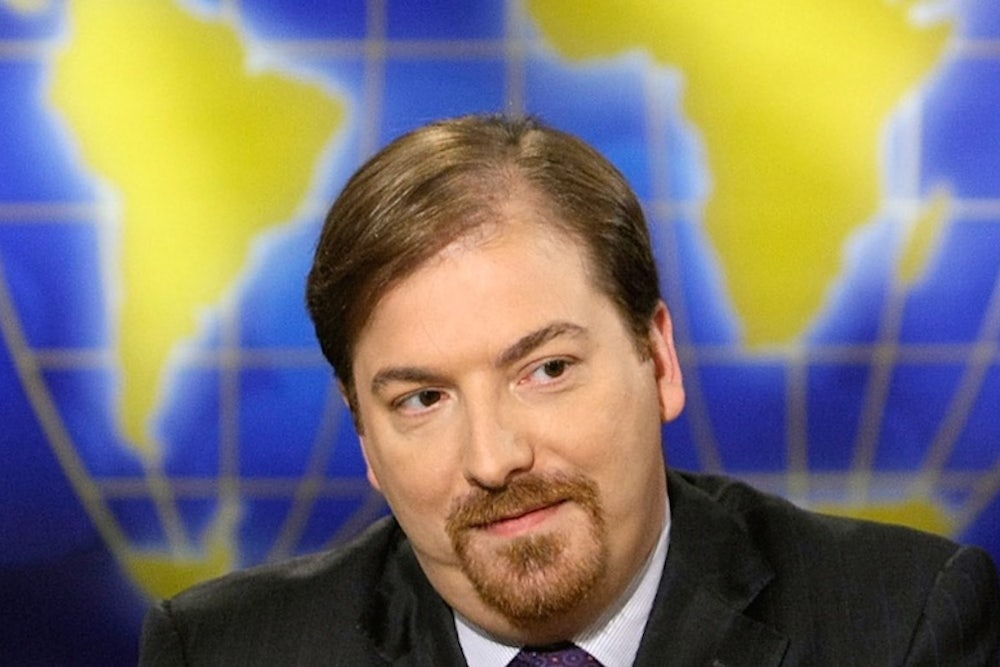This Sunday, Chuck Todd will make his debut as moderator of “Meet the Press,” having supplanted David Gregory in the role. Todd’s ascension (and Gregory’s defenestration) comes in the midst of disastrous stretch for the venerable NBC program—during which it’s tumbled from first to third place in the Sunday show ratings war. The hope amongst NBC executives is that Todd, who’s invariably described as a “political junkie,” will be better equipped to go toe-to-toe with George Stephanopoulos (at ABC’s “This Week”) and Bob Schieffer (at CBS’s “Face the Nation”) in the politically-obsessed realm of Sunday morning than Gregory, who was faulted for being more of a television animal than a political one. Television critics are already salivating at the prospect of a George-Bob-Chuck ratings battle royal.
But for all the focus on the anchor’s chair, the most important firing at “Meet the Press” may not be Gregory’s but that of his executive producer Rob Yarin, who, NBC announced on Wednesday, will now be assuming other duties on the show. That’s because, in the world of Sunday shows, which have much smaller staffs than the typical network news program, the EP play an especially crucial role. While the anchor is the one asking senators and cabinet secretaries the tough questions, it’s the EP feeding those questions to the anchor’s earpiece—as well as doing the legwork to book those senators and cabinet secretaries as guests in the first place. “I spoke with the EP’s on a daily basis, starting from Tuesday through Friday,” says Dag Vega, who, until July, served as the Obama White House’s director of broadcast media. “A savvy executive producer is definitely critical for the success of a Sunday show. They’re the ones who have to build and maintain the strong relationships needed for a big ‘get.’” Indeed, the Sunday shows may be one of the last places in Washington where the famous “man behind the man” (or, as the case may be, the “woman behind the man”) still matters.
Just consider the case of “Meet the Press.” While its ratings problems have generally been attributed to Gregory, who took over the show in 2008 after Tim Russert’s death, a closer look at the numbers reveals that MTP didn’t truly fall off the Nielsen cliff until after its longtime EP, Betsy Fischer Martin, left the show last summer. Meanwhile, the current first place Sunday show*, ABC’s “This Week,” didn’t start its meteoric ratings rise until its EP, the 31-year-old Jonathan Greenberger, took the helm a year ago.
What makes for a good Sunday show EP? Familiarity and relationships with the key players in the White House and on Capitol Hill certainly help. “The best thing Betsy did was she’d be in touch even when she didn’t want to book my boss as a guest, just asking questions about what they should talk about on that Sunday’s show,” says Doug Heye, a veteran Republican flack who, until recently, served as Eric Cantor’s communications director. “One of the things that people appreciate the most is being asked questions and having their opinions solicited.” So, in other words, when Martin did want to book Heye’s boss as a MTP guest, she wasn’t calling him out of the blue.
Just as crucial as relationships with DC power players, however, is the EP’s relationship with the anchor. Martin began her career at MTP when, in 1992 and still in college, she landed an internship as Tim Russert’s researcher; her relationship with Russert eventually became so symbiotic that the two could finish each other’s sentences. Similarly, Greenberger got his start at ABC as Stephanopoulos’s assistant in 2005; he eventually went to law school but was lured back shortly before his graduation when his old boss offered him a much bigger assignment than getting coffee—namely overhauling the usual Sunday show format by introducing shorter and pre-taped segments to the mix. When you consider that Stephanopoulos already has another full-time job, anchoring “Good Morning America” five days a week, the fact that Greenberger is familiar enough with Stephanopoulos’s thinking that he can make decisions for the show in his absence is especially vital.
Bob Schieffer has worked with “Face the Nation” executive producer Mary Hager for 20 years, ever since he hired her as his “runner/checker/researcher” when he was CBS’s Congressional correspondent. “We have just known each other so long and worked together so long, and I like to think I might have had some influence on shaping her news values,” Schieffer says. “I don’t think of her as the executive producer and she doesn’t think of me as the anchor. We kind of think of ourselves as partners.”
Yarin, by all accounts, had a good relationship with Gregory. He was the executive producer of Gregory’s 2008 daily campaign show on MSNBC and he was brought in, sources say, because Gregory felt that he’d never be able to escape Russert’s long shadow so long as Martin was the MTP EP. But Yarin, who moved from California to take over MTP, didn’t enjoy similarly tight bonds with people on the Hill. A complaint frequently heard around Washington about Yarin is that he simply didn’t do the same kind of schmoozing and checking-in as Martin.
So who will Chuck Todd’s partner be? For the moment, it’s John Reiss, an old NBC hand who’ll be on loan from Chris Matthews’s show to serve as MTP’s acting EP. But until Todd finds a permanent person for the job, it’s doubtful that MTP’s troubles will be fixed. In an ideal Sunday show world, hat person will be someone who has great contacts on the Hill and used to fetch Todd razor blades to trim his goatee.
* -- I based the first place ranking of ABC's "This Week" on its first place finish in the second quarter of 2014 among adults aged 25 to 54. CBS's "Face the Nation" finished first in total viewers that quarter.
